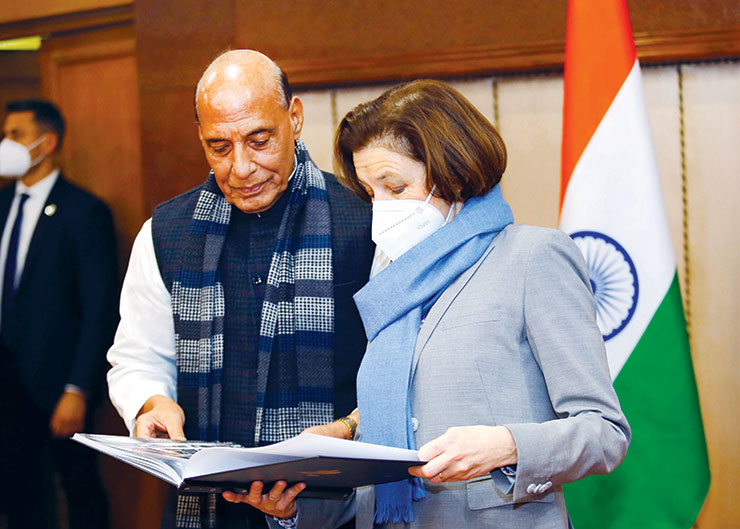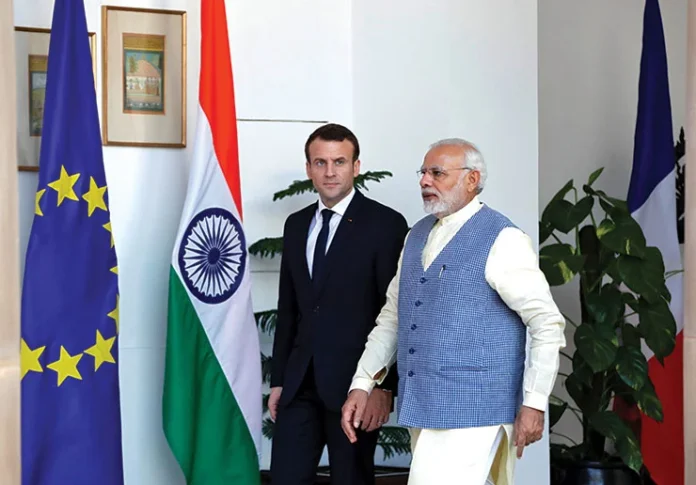Prime Minister Narendra Modi’s upcoming visit to France comes at a time when India and France are celebrating 25 years of their strategic partnership. This partnership was launched with the visit of the President of France, Jacques Chirac, to New Delhi. In his speech at Vigyan Bhavan, New Delhi, he proposed “a global partnership grounded on complementarities and common interests.” France supported India in conducting nuclear tests when the world was against it. India-France relations are testimony of the growing will to solidify bilateral cooperation in order to maintain peace and global security while at the same developing their strategic independence. India and France share a vision of peace and security, especially in Europe and the Indo-Pacific region.
Prime Minister Narendra Modi’s visit to France on July 11 is one of its kind as it sets to strengthen the continuation of strategic dialogue between India and France. The upcoming visit is an attempt to further strengthen defence cooperation, trade ties and bilateral relations. PM Modi would be in attendance as the guest of honour at the annual Bastille Day Parade to be held in Paris on July 14. This is a rare honour as France does not invite foreign dignitaries as chief guests every year.
A tri-services contingent from India has already left for France to participate in the Bastille Day Parade. Three French-made Rafale combat jets of the Indian Air Force will take part in the flypast over Champs Elysees along with French jets.
A Partnership of Equals
The India-France partnership encompasses all aspects of bilateral cooperation that also involves a strategic component. India and France cooperate in the sectors of defence, civil nuclear energy, space and security (cyber security, counter-terrorism, intelligence). This relationship is based on high levels of trust and a shared desire for partnership of equals. The strategic partnership especially in strategic fields of defence, civil nuclear energy, space and security enables India and France to maintain their strategic independence and reduce dependence on third countries in these fields.
India and France have moved beyond strategic partnerships to form a partnership to address global challenges. This broadened form of partnership has addressed key issues of climate, the environment, protecting the oceans, and health. India and France founded the International Solar Alliance (ISA). Both nations adopted the bilateral roadmap on the blue economy and ocean governance in February 2022, officialising their commitment to sustainable development, the rational use of marine resources and research in the area of oceans.
India and France in Indo-Pacific region
India and France have a convergence of growing interests in the maritime economy in the Indo-Pacific region. Both nations want to ensure a free and secure maritime order in the region. Herein maritime economy is referred to as the blue economy, marine technology, fisheries, port and shipping. President Emmanuel Macron in 2018 outlined France’s Indo-Pacific strategy – defence and security; economy, connectivity, research, and innovation; multilateralism and rule of law; Climate Change, Biodiversity, and sustainable management of oceans. India also stands for a free, open, inclusive, rules-based Indo-Pacific region, crucial for the economic development of the region & wider global community. So, there is a shared understanding of the potentialities and challenges that the region poses.
In September 2022, the Minister for Europe and Foreign Affairs, H.E. Catherine Colonna, visited India and announced the creation of an Indo-French fund to support sustainable solutions for Indo-Pacific countries. She acknowledged the growing Chinese threat in the region and decided to expand cooperation in the Indo-Pacific to ensure a balance of power. In turn, the Indian External Affairs Minister S. Jaishankar acknowledged France as a vital Indo-Pacific player.

India-France Defence partnership
The former French Defence Minister Jean-Yves Le Drian in a visit to Delhi in 2013 termed India as a ‘major priority’ for French diplomacy, stressing that military cooperation and the enforcement of their strategic autonomy should be pursued in order “to feel stronger, safer, closer to each other.” Analysts are also of the view that France and India stand shoulder to shoulder with India, drawing comparisons with the erstwhile Soviet Union.
The Indian Navy expressed its preference for the French (Dassault Aviation) order of 26 Rafale M (Marine) fighter jets over the US’ F-18 Super Hornet. These fighter jets will be deployed on India’s indigenously developed aircraft carrier INS Vikrant. As reported in the Indian Express on March 22, 2023, the Ministry of Defence has worked out a comprehensive contract, including Performance-based Logistics, which will ensure that the Original Equipment Manufacturer will be responsible for the overall maintenance of the aircraft and the supply of spares. Dassault will also build a maintenance facility for the Rafales on INS Vikrant, besides one in Goa. The company will train the naval aviation ground crew, besides training the pilots. The fighters will be fully loaded with all maritime systems, including the maritime search radar capable of detecting submarines and warships in the sea.
Trilaterals with a French equation
According to scholars, groupings based on the commonality of strategic interests and strong bilateral relations as evidenced in Indo-Pacific Mini laterals stand a potential game-changer in addressing the dynamics of the Indo-Pacific region.
India, France, and the United Arab Emirates (UAE) successfully concluded their first trilateral maritime exercise in the Gulf of Oman on June 8. The two-day exercise, which began on June 7, involved the participation of naval assets from all three countries. The exercise was aimed at enhancing maritime security and interoperability among the participating nations. It witnessed a wide spectrum of naval operations such as Surface Warfare, involving tactical firing and Drills for Missile engagements on surface targets, Helicopter Cross Deck Landing Operations, gunnery exercises, seamanship drills, Advanced Air Defence Exercises and Boarding operations.
India, France and Australia’s trilateral partnership that focused on maritime security, the blue economy and humanitarian relief efforts in the Indo-Pacific was unveiled in 2021. The first trilateral meeting took place at the officials’ level before being raised to the foreign ministers’ level in May 2021, when external affairs minister S Jaishankar met his French and Australian counterparts in New York on the sidelines of the G7 foreign ministers meeting. There is also a possibility of raising the discussions to foreign leaders’ level. The formation of the grouping was seen as a step forward for India’s new issue-based groups formed to tackle specific challenges in the Indo-Pacific. The points of discussion were cooperation on combating Illegal Unreported and Unregulated (IUU) fishing, helping develop the blue economy and protecting marine biodiversity.
Conclusion
As India-France strategic relations continue to be strengthened and broadened into new, deeper horizons of cooperation, the Indo-Pacific region is an opportunity for both nations to cooperate and establish a free, open and secure maritime order. India-France strategic partnership has grown from strength to strength therein positioning both nations as natural allies.
–The writer is an Assistant Professor, School of Law, Presidency University, Bangalore. The views expressed are of the writer and do not necessarily reflect the views of Raksha Anirveda
–The writer is Assistant Professor, ICFAI School of Liberal Arts, ICFAI University, Jaipur. The views expressed are of the writer and do not necessarily reflect the views of Raksha Anirveda






